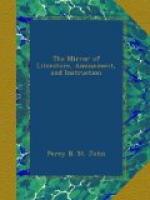His carriage was at the door—and he told the coachman to drive down —— street, that he might see in passing along, whether the crowd at the pit and gallery doors, would obstruct his progress. It was not quite so large as to stretch across the carriage road; but he was sure there were some hundreds, though so early, and he thought they must have heard who the “gentleman” was, that was then rolling by. He would not be positive, too; but he could almost swear he heard an huzza, as he passed along. There were above a dozen persons collected round the stage door; and he plainly perceived that they drew back with respectful admiration, as the new Hamlet stepped out of his carriage.
He hastened to his dressing-room, where he found his friend, the manager, Mr. Peaess, who shook him by the hand, as he informed him that they had an excellent box-book. Stubbs smiled graciously; and the manager left him with his dresser, to attire himself in his “customary suit of solemn black.” Mr. Stubbs had kept his intention of stuffing the character a profound secret, fearful lest any technical objections should be made by Mr. Peaess, and desirous also of making the first impression in the green-room. When he entered it, therefore, in the likeness of a chubby undertaker, ready for a funeral, rather than in that of the “unmatched form and feature of blown youth”—in short, the very type and image of poor Tokely in Peter Pastoral,—his eyes and ears were on the alert to catch the look of surprise, and buzz of admiration, which he very naturally anticipated. He was a little daunted by a suppressed titter which ran round the room; but he was utterly confounded when his best and dearest friend, Mr. Peaess himself, coming up to him exclaimed,—“Why, zounds! Mr. Stubbs, what have you been doing? By ——, the audience will never stand this.”
“Stand what?” replied Henry Augustus Constantine Stubbs.
“What!” echoed the manager; “why this pot-belly, and those cherub cheeks.”
“Pooh! pooh!” replied Stubbs, “it’s Shakspeare’s, and I can prove it.”
“You may pooh! pooh! as much as you like, Mr. Stubbs,” rejoined the manager; “but, by ——, you’ve made a mere apple-dumpling of yourself.”
“Do you think so,” exclaimed Stubbs, glancing in one of the mirrors—“Well; I do assure you it is Shakspeare, and I’ll prove it. But what shall I do?” and he looked imploringly round upon the broad, grinning countenances of the other performers.
“Do?” ejaculated Mr. Peaess; “you can do nothing now—the curtain has been up these ten minutes; Horatio and Marcellus are coming off, and you must go on.”
At this moment the ghost of Hamlet’s father entered the room, but before he had time to look upon his son, the call-boy’s summons was heard for the King, Queen, Hamlet, Polonius, Laertes, &c., to be ready, and forth sallied poor Mr. Henry Augustus Constantine Stubbs, to prove, if he could, to the audience, that his rotundity was perfectly Shakspearian.




